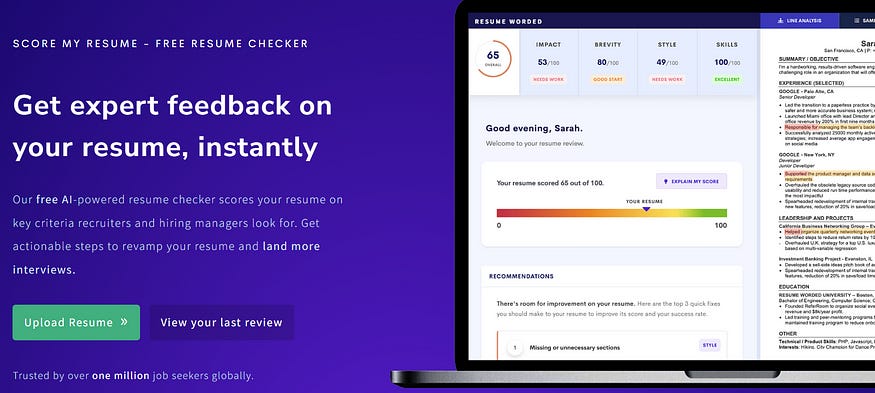3 Ways I Use AI to Find Jobs and Get Interviews
AI can be an amazing tool for finding a job. Here are 3 ways I use AI to craft a better Cover Letter, CV, and prepare myself for an Interview.
Perhaps AI will REPLACE you in the future, but right now it can be an amazing tool for FINDING a job. Many people don’t know how to use AI to boost their chances, so using these tools can throw you in the front line of being noticed by companies.

Why You Should Know This?
If you are looking for your first or next job, you know that finding the right job is frustrating, time-consuming, and with the current situation in the tech market, highly competitive! So if you can leverage some method to increase your chances of being seen and having a spotlight shining on your portfolio, then you can get in front of many of your competitors.
I am currently searching for jobs, I know the draining process, and what I am suggesting here is what I am actively using myself. They are personally proven methods that have significantly increased my number of interviews. And the cherry on top… they’re all Free. So I’m not trying to sell you anything.
Here is a list of 3 Ways I Use AI to Find Jobs that you probably don’t:
1) Writing Cover Letters
Cover Letters are boring and time-consuming to write. Everyone is relieved when they see the job application only needs a resume. (pro tip: if they don’t explicitly mention a cover letter as a requirement but have the option to upload “additional documents”, it’s best to upload a cover letter.)
Each recruiter spends a maximum of around 10–20 seconds to check your application. So you don’t want to spend half an hour writing a cover letter unless it’s a really specific position you are very keen to acquire. What you must do to make use of your time and apply with a good cover letter, is having a general cover letter showcasing who you are and why you are looking for this position. Once you have that, all you need to do is make minor changes in your cover letter to make it suitable for that position in that company.
How do you make a generic cover letter? Here are two ingredients: ChatGPT, and your CV
All you need to do is go over ChatGPT and paste this prompt:
generate me a generic one-page cover letter for [YOUR DESIRED POSITION] based on this resume: [YOUR RESUME]
The next thing you want to do is wipe ChatGPT’s footprint off of your cover letter. Anyone who has worked with ChatGPT can spot a text generated by it and believe me, the recruiter whose whole job is reading CVs and Cover Letters can spot it from a mile away. Go over the generated cover letter, read through it, add/remove relevant information, replace some obvious wordings of ChatGPT, and add your flavor and language wherever possible. By the end, you must end up with a generic cover letter that expresses WHO you are and WHY you are a suitable candidate.
2) Scoring CV
I bet you 99% that your CV is worse than what you think. It hurts. I have spent so much time crafting my CV, making sure I have squeezed as many skills and impressive things about myself into it. But this might not be the case with the recruiter, and at the end of the day, that’s what matters. If you’re not getting anywhere with your CV, most probably there is something wrong with it.
How can you know if your CV is good?
Your CV must be concise, full of metrics, without repeating weak verbs, and readable. To make sure your CV is so, simply head over to ResumeWorded (not sponsored) and upload your resume. Their AI-powered tools evaluate it based on certain criteria. It gives you feedback, it’s free, however, it will give you additional suggestions and fixes if you go premium.
I have tested almost every resume-scoring website and this is one of the few that doesn’t get on your nerves to buy a subscription or pay for something.
3) Prepping for Interview
If you have reached this point it must mean that you have done the previous 2 steps perfectly. Now you have been invited to an interview for position X at company Y. While many will spend time on Leetcode or generally prepare themselves, there is a secret that can highlight you easily: Prepare answers for that company’s problems.
Let’s say that you are interviewing for a Machine Learning position at X/Twitter, what is a challenge that the interviewer will likely ask you about? Well, it could be how to better assemble the For You Feed for a user. Or it could be about the Community Notes. Once you prepare for the specific problems of that company, the recruiter will instantly see the value you will bring to the team.
How to Prepare Yourself?
You only need ChatGPT, again… What you should do is give it the job description along with related articles to that company especially if it’s a startup. Maybe give it the homepage of the company or the about section. Whatever you can find that describes the company’s mission and projects can help figure out what subjects are of interest to them.
Next, you prompt ChatGPT with this:
I want you to act as a “Job Interview Coach for a [***] Position”. I will give you some information about the job and its job description and then I will ask you to give me some potential questions that might be asked during that interview and the answers I must prepare. I will also ask you to give me some topics I must have in mind and study about.
Once you do that and feed ChatGPT with the job description and relevant information, it will give you a list that looks like this:
Then you can search for some of the topics it suggests and you are guaranteed to have a higher chance of acing it during the interview.
Whether for a tech position or not, landing your desired job is about those small details that separate you from the crowd. The methods I discussed are not something I simply read on the internet, but actual solutions I employed and have witnessed the change.
The opportunities AI gives us are countless and I am sure there are more out there. So please comment your own experience and specific tools and tips you think might make a candidate stand out.










I test "ResumeWorded" and it work great. Thanks for sharing.